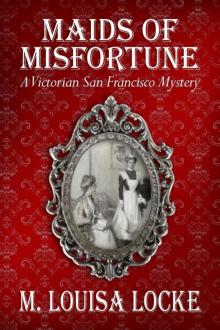- Home
- M. Louisa Locke
Scholarly Pursuits Page 3
Scholarly Pursuits Read online
Page 3
Annie went over and poked at the fire. “I still don’t understand why you say there was something odd about this Miss Sutton.”
“First of all, why come all the way to California to study German? The first term of the university’s medical school doesn’t even commence until next February. I mean, I can understand if she was coming here to keep her cousin Grace company. But why stick with that plan once Grace got ill and wasn’t well enough to return this spring? In addition, if everything is so aboveboard, why did she pretend not to know who Grace was when I first asked after her?”
“Maybe she misunderstood you.”
“No, Annie, I was quite clear, and she only admitted the truth when I pointed out that she was wearing Grace’s shawl.”
“How ever did you know that?”
“I’d admired it once, and Grace told me her mother had knitted it and embroidered her initials in the corner because Grace was forever misplacing it.”
“What good detective work. What was Miss Sutton’s explanation for why she didn’t say who she was right away?”
“She never gave me an explanation. After taking me up into the attic, she simply told me about Grace being her cousin and how she’d become ill and therefore couldn’t return to school. Why couldn’t she have said all that as soon as I asked after Grace?”
“I agree that is odd.”
One of the things Laura appreciated about Annie was how quick she was at understanding things. “And I could see that she’d been rummaging through Grace’s trunk. What if she isn’t who she says she is? What if she’s some sort of thief?”
Annie gave her a look of disbelief, and Laurie said hurriedly, “I know, I know. Nate would say I am making a mountain out of a molehill.”
“Yes, he would. And I don’t blame him. You said she was in your German class, so she’s obviously enrolled as a student. And surely the landlady wouldn’t have left Grace Atherton’s trunk in the room with a stranger.”
Laura laughed and said, “I guess I was letting my imagination run away with me. In fact, when I stopped by the landlady’s room on my way out to ask if she’d heard from Grace, she glared at me and said she’d gotten a telegram from Grace’s mother in Nebraska last week. The letter said Grace would probably not be returning but to hold the room for her cousin, Miss Sutton.”
“Well, Laura, that seems pretty definite. Did either the boarding house keeper or Miss Sutton say exactly what was wrong with Grace?”
“No, and I asked Miss Sutton. She just ignored me and made me feel rude for inquiring.”
“Maybe that was the root of her reticence from the beginning. She didn’t want to share her cousin’s business. It’s not as if you were a close friend of Grace’s, were you?”
“No, Grace was more of an acquaintance than a friend, although I wouldn’t have minded getting to know her better. I did like her, though. She didn’t look down on me because I was a freshman, and she didn’t take any nonsense from the fraternity men; I admired that. I feel sort of remiss that I didn’t even notice she’d left campus before Thanksgiving and never returned. I hope there isn’t something seriously wrong.”
A few hours later, Annie Dawson found herself nibbling on an oatmeal cookie and staring into the flames snapping in her bedroom’s fireplace. Looking at the clock on the mantel, she saw it was after ten, so Nate should be here any minute. After her brief conversation with Laura, she had finished the financial report she’d been working on for the Protestant Orphan Asylum Society and then gone down to the kitchen to see if the maid Kathleen or her cook, Beatrice, needed anything from her before she retired to her room.
As usual, they had everything well in hand, reporting that all the boarders were in their rooms for the evening. She told them to go off to bed since Nate had promised her that he’d have a quick meal at one of the restaurants near his law office. Beatrice insisted she take a plate of left-overs up to her bedroom with her—in case Nate needed a snack when he arrived home. She was kind enough not to mention that most of it would probably be eaten by Annie, who seemed perpetually hungry nowadays.
Picking up a second cookie, she smiled and placed a hand over the taut bump that had become visible in the last few weeks, especially when she took off her corset. The elderly dressmakers, Miss Minnie and Miss Millie, had worked a miracle over the past week, letting out the seams in all of her dresses and promising that they could easily accommodate any additional changes required by her expanding girth in the coming months.
Competing with the snap and crackle of the flames in the fireplace was the low murmur of voices from the next-door bedroom where Laura and Celia were probably sharing their impressions of the first day of classes. Hearing Laura’s voice rise then fall, she imagined that her sister-in-law was telling Celia about her strange interaction with Miss Sutton.
How characteristic it was of Laura to turn something that had a perfectly innocent explanation into a dramatic tale of possible skullduggery. Not that Annie hadn’t been known to do something similar in the past. Although to be honest, her own suspicions often had a distressing tendency to turn out to be well-founded. Thank goodness, none of her current clients seemed to be harboring any criminal wrong-doing, because she had promised Nate that she would steer clear of anything with the slightest whiff of danger while she was pregnant. She had, however, pointed out that two of the four recent investigations she’d been involved in initially came through his legal practice.
At the sound of the front door opening downstairs, Annie went over to the mirror above the washstand to make sure she didn’t have any cookie crumbs caught in the lace along the edges of her robe.
The door to the bedroom opened and closed, and her husband came up behind her and said, “Glad to see after five months of marriage, you are still willing to stay up for me.”
He reached around her waist and pulled her close, resting his head on hers so they were both staring into the mirror. “I’m glad you did, although if Mrs. O’Rourke were still awake, she’d give me a rare scolding. She seems to think you need more sleep than you have been getting. I’ve heard of eating for two, but not sleeping for two.”
Looking at their images, she wondered what their child would look like. Her own hair was light brown, with tints of red inherited from some unknown ancestor. Her skin was pale, and her undistinguished nose had a distressing tendency to freckle if she forgot her parasol during the summer months. Her eyes, which some people said were her best feature, were a light brown.
Nate was darkness to her light. Dark complexion, dark brown hair, eyes that gleamed black in the soft firelight. His high cheekbones and aquiline nose completed the impression of a dangerous bird of prey, until he smiled, as he just did. Her heart fluttered in response.
Turning into his arms and leaning against his chest, she said, “I’m afraid I snapped at Beatrice this morning. She chided me for getting up in time to say good-bye to Laura and her friend Celia. She should have been happy I didn’t try to see you off to work. What time did you leave? The bed was cold when I woke up.”
“I left at five-thirty. I had an early meeting with Uncle Frank and Abel Cranston to discuss how to handle the firm’s growing work load. So what do you think of Laura’s new roommate?”
“She seems quite nice. Sad, but that’s to be expected, given that she just lost her mother. Beatrice, as usual, thinks she’s too thin and is determined to remedy that situation. Speaking of fattening people up, over on the table there is a ‘little something’ she put together for you to eat.”
Nate laughed and gave her a quick kiss on her nose before going over to see what Beatrice had fixed for him. He took a linen napkin off a sandwich, thick with sliced ham and cheddar cheese, and said, “This looks perfect. Now tell me how your day went. Were you able to speak to Mr. Livingston over at the Silver Strike Bazaar?”
“Yes, he was very understanding about Miss Millie and Miss Minnie’s decision to continue boarding here, at least until summer.”
“And Laur
a? Are she and Celia going to be all right sharing the small room next door? More importantly, are you all right with this arrangement for now? I know you’d made the suggestion for Celia Beale to move in because you thought Laura would be moving up to Miss Millie and Miss Minnie’s attic rooms in a week or two, freeing up Laura’s current room for a nursery. What if Laura and Celia can’t move out until the spring term ends in May?”
Annie looked around their bedroom, which had been the guest bedroom when her aunt and uncle were alive, thinking about how much pleasure the room gave her when she first moved into this house. At the time, it had seemed so spacious, compared to the tiny, cramped rooms she’d lived in during the first five years after her first husband’s death.
Certainly the room had become more crowded now that she was married to Nate, but she still loved all of it—the bay window that caught the first rays of the morning sun, the matching wardrobe and washstand that gleamed from age and Kathleen’s energetic polishing, and the clock and blue vase sitting on the mantel over the fireplace, which were the only pieces she’d inherited from her mother who had died when she was very young. Last, but not least, she wouldn’t, for the world, replace the old-fashioned mahogany bed—where she’d been born over twenty-seven years ago—the bed where she hoped her own child would be born.
Suddenly, she knew her answer.
“Nate, this won’t be a problem. The nursery can wait. The baby can just stay here with us for as long as necessary. And I’m not due until June, which is over five months away. Who knows what will happen between now and then?”
Chapter 6
Early Friday Evening, January 7, 1881
Berkeley
“During the past year, one of the club-houses has been re-arranged and neatly fitted up for the two literary societies.” 1881 Blue and Gold Yearbook
As Caro Sutton entered the small wooden railroad station on Shattuck Avenue, she found herself looking at the crowd of people waiting for the next out-bound train to Oakland through her cousin Grace’s eyes. This was the result of spending the day reading two and a half years of Grace’s weekly letters. Her Aunt Jean had thrust two old cigar boxes filled with these letters into Caro’s trunk, saying tearfully, “Maybe they will help you figure out what went wrong, what we missed.”
Caro had read through her own ribbon-tied bundle of letters from her cousin, as well. These went back over fifteen years, from the first birthday note a five-year-old Grace had written out in block letters to send to her older cousin who lived far away in Chicago, to the letter Grace had written this November talking about how she couldn’t wait until Caro joined her after Christmas.
Caro never traveled anywhere without these letters, her most precious possession from the person she loved best in the world. A lonely child with a sick mother and a cold father, Caro started visiting the small Nebraska farm where her aunt and uncle and cousins lived when she was eight and Grace was four. That was sixteen years ago. Despite the age difference, each summer they had shared a room, shared secrets, and shared a growing love and respect for each other.
Then came the four years when Caro lived in Lincoln while she got her degree from the University of Nebraska. Four happy years when Grace lived with her during the week so she could attend the girl’s high school in Lincoln. Caro had assumed this pattern would continue when Grace graduated from high school and started going to the University of Nebraska. That was the only reason Caro had accepted a job teaching math in Lincoln’s Boy’s High, so that she and her cousin could still go on boarding together.
But then, the spring of Caro’s last year in high school, a minister had come to Nebraska on a speaking tour to raise money for missionary work out west. After attending Reverend Mason’s talks, Grace invited him to spend the weekend at her family’s farm so he could preach in their small local church.
This had changed everything.
Reverend Mason’s stories about the opportunities for urban missionary work in the San Francisco Bay area and the need for good moral women to become scholars at the new California university profoundly affected her warm-hearted cousin. After the reverend left town, Grace announced to her parents that God had called her to go west and her devout parents hadn’t stood in her way. Caro spent that coming summer working in a dry goods store in Lincoln to save up the money she needed for room and board and the round-trip train ticket to Berkeley.
Caro had been upset, but she loved her cousin too much to stand in her way. She even had contributed some of her own precious savings to make sure Grace had proper clothes so she wouldn’t feel too much like a country bumpkin going to school with more urbane students from the bustling city of San Francisco.
And today, reading Grace’s letters, Caro was reminded of how happy her cousin had been at Berkeley…at least during her first two years there. Her letters had been full of her enthusiasm for her classes, her enjoyment of the natural beauty of the region, and her pride at the charitable work she was doing with Reverend Mason, including working with a local school for the deaf and blind. Now that Caro thought of it, she should speak to Reverend Mason as soon as possible. If there was anyone Grace would have confided in here, if she was in trouble, it would have been him.
And something definitely had been troubling her cousin. Over and over in the letters from this past fall, Grace had said how anxious she was for Caro to join her after Christmas. At the time, Caro read these references to her planned trip out west as Grace’s attempt to cheer Caro up, because Grace knew how bored Caro was with her life in Lincoln teaching snotty schoolboys.
In hindsight, she now believed that Grace was desperate for her to join her, because she needed Caro’s help.
Why didn’t she tell me what was wrong? What could have possibly happened to send her running home, when in a month I was to have joined her?
In contrast, Grace’s letters to her mother this fall seemed designed to convince her family back home that everything was just fine. She filled her weekly missives home with amusing vignettes about the people, places, and daily events of campus life.
She’d done such a good job on these details that when Caro came down to breakfast this morning, she knew exactly what the landlady, Mrs. Feltzer, would say as she dumped the chipped bowl holding a mound of scrambled eggs onto the table, how the boarder Chad, an awkward, open-faced sophomore, would carefully spread the butter to the very ends of his piece of toast before dunking it into his milky tea, and the way the hat shop owner, Miss Roberts, would look at everyone with distain as she sipped her coffee. Caro also knew that the other two boarders, two brothers taking courses in the agricultural college, would have already left the boarding house, since they were paying their way through school by milking cows at a nearby dairy farm.
Now, as she glanced around the brightly lit train station waiting room, Caro heard Grace’s voice in her head, pointing out that the scattering of men in top hats and overcoats, accompanied by women wearing elaborately decorated gowns, were probably university professors and their wives on their way to San Francisco for a night at the theater. She even recognized some of them. The young red-haired man with the enormous head had to be Josiah Royce, the instructor stuck teaching all the freshmen composition and logic classes, and the pretty young woman listening to his animated conversation was probably his new bride.
The man conversing with Royce was most certainly the senior man in the English department, Professor Sanders, as he perfectly fit Grace’s description of her favorite professor as a handsome man whose silver hair and mustache accentuated his tan skin and deep-set blue eyes.
What she couldn’t remember from Grace’s letters was whether or not Sanders was married or had children. Unfortunately, the striking brunette who stood next to him, risking a lung infection from the amount of bare skin her evening wrap revealed, was of that indeterminate age that meant she could be either his very young wife or his precociously mature daughter. In either case, the woman looked extremely bored, except when a couple of the male
university students cut a caper in front of her.
And caper they did, strutting up and down the platform in their motley assortment of hats, noisily announcing their plans for the evening, making puerile jokes about one man’s capacity for beer, another’s dalliance with a Mills Female Academy co-ed. Several of them were still dressed in their uniforms from the military drill in which every able-bodied male student was required to participate on Wednesdays and Fridays…another tidbit she knew from Grace’s letters to her family.
Taken all together, these students didn’t strike Caro as so very different from the young men she’d studied with for four years at the University of Nebraska. Yet, if she was going to learn who might be responsible for whatever had happened to her cousin, she needed to start to connect more of the names of the people that Grace’s letters mentioned to real individuals.
For example, she wondered who the tall blond gentleman was. The one joking with the undergraduates. Everything from his neat mustache and elegantly tailored evening clothes to the ebony cane he leaned on suggested he was a faculty member, not a student, but which one? He wasn’t any of the professors she’d met so far, nor did she think he was a student in any of the classes she was taking. Could he be the well-dressed instructor Grace had mentioned as teaching her French classes her first two years at Berkeley?
That was why she was here tonight. She needed someone to help her put names to faces as quickly as possible, someone who could also provide her with some background information about the campus.
And, after re-reading Grace’s letters from this fall, there was only one student who stood out as someone who might be able to play this role––the first-year student who she hoped would be coming on the train that was just arriving in order to attend the first Neolaean Literary Society meeting of the spring term.

 Scholarly Pursuits
Scholarly Pursuits Lethal Remedies
Lethal Remedies Victorian San Francisco Stories
Victorian San Francisco Stories Madam Sibyl's First Client: A Victorian San Francisco Story
Madam Sibyl's First Client: A Victorian San Francisco Story Uneasy Spirits: A Victorian San Francisco Mystery
Uneasy Spirits: A Victorian San Francisco Mystery Dandy Detects: A Victorian San Francisco Story
Dandy Detects: A Victorian San Francisco Story Pilfered Promises
Pilfered Promises Dandy Delivers
Dandy Delivers Kathleen Catches a Killer
Kathleen Catches a Killer Violet Vanquishes a Villain
Violet Vanquishes a Villain Maids of Misfortune: A Victorian San Francisco Mystery
Maids of Misfortune: A Victorian San Francisco Mystery